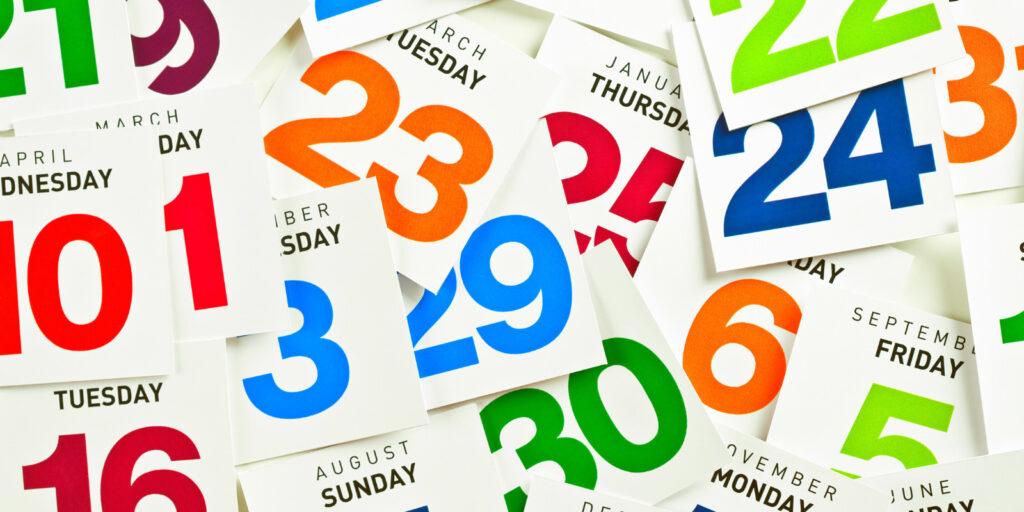
Need to know the days of the week in German but don’t know where to start? Check out this post for a beginner’s guide to the days of the week in German.
If you’re starting to learn the days of the week in German, you’ll be surprised to know that they’re not that different from English. In fact, as an A1 German speaker, the days of the week in German actually make more sense to me than they do in English.
So, if you’re trying to learn the days of the week in German and need some help, you’ve come to the right place. This post alone not only highlights what these days are in German but it also discusses the origin behind them and how to use them in everyday German speech.
German Language & Culture Series
P.S. This is a post in my German Language & Culture series. Here is the complete series:
German Addresses: German Address Format: How to Mail a Letter to Germany
German Time: The Non-Native Speaker Guide to Telling Time in German
German Greetings: The 10 Most Common German Greetings and Introductions
German Numbers: The Ultimate Guide for Learning German Numbers 1 to 100
German Alphabet: The Best Alphabet Guide of All Time
German Days of the Week: A Beginner’s Guide to the Days of the Week in German
German Emails: The American Guide to Writing German Emails
German Body Parts: A Step-by-Step Guide to the Body Parts in German
German Vegetables: The Ultimate Guide to Vegetables in German
German Pronouns: The American Guide to Learning German Pronouns
German Colors: Colors in German: A One Stop Resource
German Fruits: Fruits in German: What You Need to Know
German TV: 10 German TV Shows You Need to Watch
German Curses: German Swear Words: What You Need to Know
German Idioms: 10 German Idioms Every American Should Know
What are they?
Here are the following days of the week in German:
| English | German |
|---|---|
| Monday | Montag |
| Tuesday | Dienstag |
| Wednesday | Mittwoch |
| Thursday | Donnerstag |
| Friday | Freitag |
| Saturday | Samstag |
| Sunday | Sonntag |
Origin
Now that you’re familiar with what the days of the week are in German, reading a quick explanation of their origin will help you remember them.
Montag
Montag in German is actually named after the German word for “moon”, der Mond. So, in other words, Monday to Germans is technically “Moon-day”. In fact, the English word “Monday” actually comes from this origin as well.
Dienstag
Dienstag in German is named after the old Germanic god, Tyr. He was known for being the god of war, law, and heroic glory back then. In fact, the English word “Tuesday” is also named after him as well.
Mittwoch
Mittwoch in German can be literally translated as “mid-week” in English. This obviously makes sense since the day is right in the middle of the week, which in my opinion makes it the easiest to remember.
Donnerstag
Donnerstag in German is named after the German word for thunder, der Donner. So, in other words, Thursday to Germans is technically “Thunder’s-day”. In fact, after doing more research, Donnerstag is also closely connected to Donar, the old Germanic god of war. However, in today’s American society, we recognize this god as Thor, its Norse name.
Freitag
Freitag in German is named after the old Germanic goddess, Frige. Back then, she was known for being the goddess of marriage and motherhood. In fact, the word Frei actually means “free” in English so you can easily remember this day as a day of freedom before the weekend starts.
Samstag
Samstag in German is named after the Old High German word Sambatztag, which means “Sabbath” or “day of rest” in English. In fact, in some German-speaking countries, Samstag is alternatively known as Sonnabend. Sonnabend translates to “sun-evening” in English and it’s mostly used by an older generation of German speakers.
Sonntag
Sonntag in German is named after the German word for “sun”, die Sonne. So, in other words, Sunday to Germans is technically known as “the day of the sun”. In fact, as you might of guessed, the English word “Sunday” actually comes from this origin as well.
Gender
The days of the week in German are all masculine. Therefore, that means that all of the days have the masculine article for “the” which is der.
Abbreviations
Similar to English, Germans also abbreviate their days of the week. They do this by using two letters for each day in short form. Here is a comparison:
| English | German |
|---|---|
| Mon. | Mo |
| Tues. | Di |
| Wed. | Mi |
| Thurs. | Do |
| Fri. | Fr |
| Sat. | Sa |
| Sun. | So |
Grammar
Lastly, it’s not enough to just memorize the days of the week in German. You also need to be familiar with how to use these days in an everyday context.
From [weekday] to [weekday]
If you wanted to say “From [weekday] to [weekday]” in German, you would need to follow the following format:
Von [Wochentag] bis [Wochentag]
For example, if an American said “From Monday to Friday” in English, it would be translated as “Von Montag bis Freitag” in German.
Yesterday, today, and tomorrow
In addition to knowing the days of the week in German, some other words you should know include how to say “yesterday”, “today”, and “tomorrow” in English. Here is a comparison:
| English | German |
|---|---|
| yesterday | gestern |
| today | heute |
| tomorrow | morgen |
So, for example, if an American said “Today is Monday.” in English, that would be translated as “Heute ist Montag.” in German. The same word order also follows if the American said “yesterday” or “tomorrow” instead of “today”.
Capitalization
When it comes to capitalization, days of the week function like nouns in this case. However, there is one exception. If a day of the week is used like an adverb instead of a noun in a sentence, then that day of the week would not be capitalized. Instead, it would just have a lowercase “s” attached to it.
For example, if an American said “I work on Tuesdays.” then that would be translated as “Ich arbeite dienstags“.
However, if the adverb for a day of the week in German is used at the beginning of a sentence, it would need to capitalized.
For example, instead of saying “Ich arbeite dienstags.” to translate “I work on Tuesdays.”, you can also say “Dienstags, arbeite ich.” This sentence alone conveys the same meaning in German but the word order is different.
On [weekday]
If you wanted to say “On [weekday]” in German, you would need to follow the following format:
Am [Wochentag] (only if it’s at the beginning of the sentence)
am [Wochentag] (for all other times)
For example, if an American said “On Monday, I read a book.” that would be translated as “Am Montag habe ich ein Buch gelesen.” In addition, you can also say “Ich habe am Montag ein Buch gelesen.” which means the same thing.
Question & Answer
Here are some tips you’ll need if you want to ask a German or answer “What day of the week is it?” in German.
For one thing, the question can be phrased in many different ways. Here are some examples:
- Welcher Tag ist heute? – Which day is today?
- Welchen Tag haben wir heute? – Which day do we have today?
- Welchen Wochentag haben wir heute? – Which weekday do we have today?
However, please keep in mind if you’re being asked these questions, the German may be asking for the date instead of the weekday. So, if they say Wochentag instead of Tag that clears it up.
Here are some common responses you can say as a response:
- Heute ist …
- Heute haben wir…
Overall, I really hope you enjoyed reading this beginner’s guide to the days of the week in German. Please let me know in the comments down below which fact about the days of the week in German surprised you the most. I would love to hear from you!
P.S. If you’re looking to find more ways to memorize the days of the weeks in German, I highly recommend listening to this song I found on YouTube. It’s SO cute!!
Love this post? Pin it for later!

Follow me on Instagram!











Leave a Reply